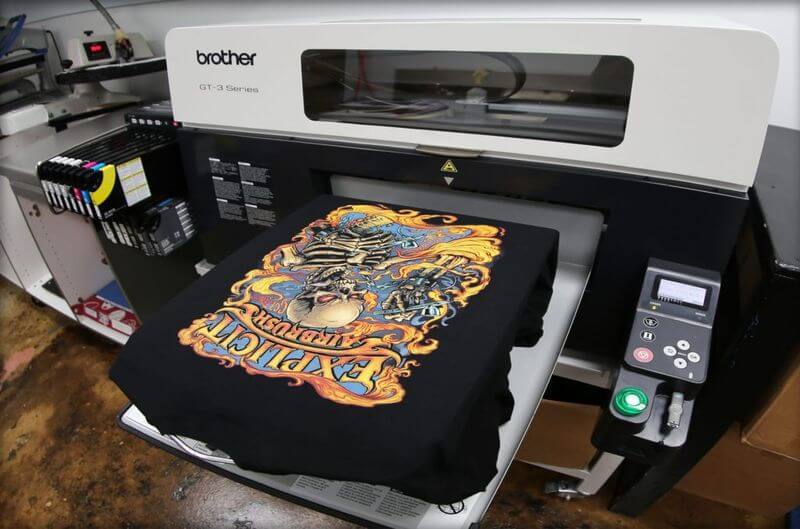The Ultimate Guide To Digital Printing
Wiki Article
The smart Trick of Digital Printing That Nobody is Talking About
Table of ContentsWhat Does Digital Printing Mean?Our Digital Printing IdeasSome Ideas on Digital Printing You Need To KnowWhat Does Digital Printing Mean?The Greatest Guide To Digital PrintingFacts About Digital Printing RevealedThe Buzz on Digital PrintingUnknown Facts About Digital Printing
Customization also permits businesses to stick out in a crowded market by creating special advertising and marketing materials that distinguish them from their competitors. Among the primary benefits of digital printing is the capacity to print variable data. Each printed item can be special, allowing organizations to produce tailored advertising products that speak directly to their target audience.Digital printing also enables for modification in the design of advertising and marketing materials (Digital Printing). With electronic printing, organizations can develop layouts that are distinct and tailored to their particular demands.
Getting The Digital Printing To Work
This advantages businesses that intend to evaluate various marketing strategies or release new product or services. By publishing smaller sized quantities of advertising products, companies can lower waste and stay clear of the requirement for excess stock. Digital printing is additionally flexible. It can publish on various materials, consisting of paper, cardstock, vinyl, and steel.By making use of various products and layouts, services can create one-of-a-kind advertising materials that stick out from their competitors and stand out from their target market. Digital printing also uses uniformity. With conventional printing methods, there is commonly variation between prints due to differences in ink insurance coverage, pressure, and other aspects.
This uniformity can aid build client trust and credibility, revealing that the service is dedicated to giving premium products. Uniformity is particularly essential for services that wish to build customer trust fund and credibility. By ensuring that every print corresponds, businesses can reveal that they are dedicated to supplying high-grade products and focusing on the information.
The Facts About Digital Printing Revealed

In addition, digital printing creates less waste since it can print on demand and in smaller amounts, reducing the demand for excess supply and products. Digital printing likewise utilizes less energy compared to typical printing methods. Digital printers do not require as much power to operate, as they do not require to warm up as a lot or make use of as much power to run.
Facts About Digital Printing Uncovered

Countered printing calls for a plate for each color printed. Traditional balanced out printing is a print approach that makes use of aluminum plates to transfer ink onto a rubber sheet (commonly described as a "covering"). The photo is after that rolled onto the printing surface area. This printing method is considered "offset" because the ink is not transferred to the paper directly.
Not known Details About Digital Printing
The devices's set-up costs are high originally, extra units become fairly less costly as the quantity rises. Offset printing enables for a vast array of print products to be made use of throughout manufacturing. It permits the printer to use various paper types, custom coatings, and different inks. The premium images created through balanced out printing make it the preferred technique, especially amongst visuals designers, when looking for the best shade reproduction, detail, and professional-looking prints.The fundamental printing technique continues to be countered. For digital inkjet printing, ink is transferred straight onto the surface area. Instead of relying upon light weight aluminum plates and rubber coverings to move an image, digital printing makes use of fluid ink throughout manufacturing. Standard home inkjet printers are among the most common digital printing techniques.
What Does Digital Printing Do?
Since offset printing can blend custom shade inks for each work, it will naturally obtain the shades spot-on. Count on countered printing for tidy, distinct kinds and photos without touches or places.It you could check here costs a whole lot to begin Going Here a balanced out task. You have to invest money into producing the plates, which requires time. However, once you have actually spent it, all of the materials are prepared to go, and you'll invest much less on large balanced out tasks than a digital print, which has to do with the exact same per piece regardless of how large the task gets.
Each print equals. You risk less odd variants created by imbalances in water and ink. Digital printing is much less costly for low-volume work. The cost per unit drops for electronic printing, so eventually, they crisscross. Transforming info within a solitary print task. For instance, claim you were publishing out postcards promoting a concert.
See This Report on Digital Printing
While digital printing or inkjet printing is the favored selection in the existing times, there are compelling reasons to convert from offset to digital printing systems. When publishing balanced out or digitally, crucial decisions and procedures are involved in shade matching.Whichever the situation, the color will certainly need to be matched. Shade matching of electronic printer ink is no much longer testing with dyes and pigments. Industrial inkjet printing provides adaptability for printing on various substrates. Digital printing is perfect for customers that do not call for longer runs and warehousing products.

One advantage of digital printing is picking from a wide variety of electronic substratums. With offset printing, substrates comprise, typically, 30% of the cost of the task. With electronic printing, the expense of the substratum in the general task is small. This allows for even more selections than ever, which benefits online marketers and services.
Digital Printing Fundamentals Explained
drop-on-demand is the second printing modern technology to think about. Continual inkjet systems require substantial upkeep, even more operator training, and greater downtime. However, equipment costs in inkjet printing are far lower than offset printing as there are no plate-making, plates, and press costs. Beyond the capital expenditure, the prepress tools and printing presses call for highly skilled drivers in offset printing, which adds labor prices.Report this wiki page